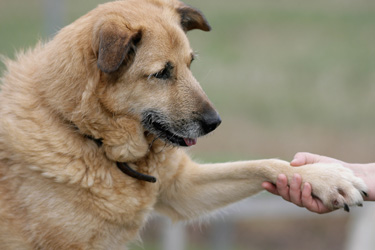Talking to Clients about Adopting a Senior Pet

When clients talk about adopting a new pet, sometimes their situation indicates that a puppy is not a good fit. For example, busy families may not have the necessary time to train a young or headstrong dog; and new parents may want a dog, but don’t want to risk having an exuberant, bouncy pet around that may knock over the baby. Since shelters are often full of healthy and active mature animals that need a home, why not suggest they adopt a senior animal?
Reasons to Adopt a Senior Pet
When talking with clients about adopting a pet, the following reasons can be given as support for bringing a new, even though older, pet home.
#1. Senior animals make loving and loyal companions.
There are countless older animals housed at shelters just waiting for a second chance. Many may have once been in a home surrounded by a loving family, but their situation changed. Divorce, death, new baby, job loss, or a move are often the stated reasons for older animals to be placed at a shelter.
#2. They have already gone through their puppy stage!
The troublesome puppy behaviors of nipping, jumping, chewing, and teething are over for the mature dog! Senior dogs also have their adult teeth so they don’t need to chomp on everything! Instead of running off with your shoes, the mature dog is ready to play fetch, go for a long walk, and show that they want to spend their time with you!
#3. Older animals are often trained to understand basic commands.
Having a dog that knows how to listen and how to obey basic commands, not to mention one that is house trained, is a definite advantage! If a client has never owned an animal before, they will greatly appreciate bringing an animal into their family that already knows how to behave in a home and with the family.
#4. Don’t believe the saying of “you can’t teach an older dog new tricks,” because you can!
Dogs can be trained no matter what their age. Not only are senior dogs smart, but they also have a longer attention span than most pups which makes them easier to work with!
#5. Mature animals are calmer and have a lower energy level.
Senior dogs are past the hyper and energetic puppy stage, and will be less likely to get into any type of destructive trouble. Their lower energy level also makes them good for being around young children.
#6. Older animals tend to have better manners.
These animals have spent the earlier part of their life learning to live with people, and have a good understanding of how they need to behave.
#7. They make good company.
An older pet can provide wonderful company, especially for an elderly family member. The senior animal’s calm demeanor, along with the enjoyment it gets from being with someone who just wants to pet and talk to them, makes them the perfect companion.
Making the decision to adopt an older dog is not only good for the animal but will most likely prove to be good for the people, too!
For additional information on ways to further the care of an older pet, contact your Covetrus Animal Health representative at: 855.724.3461.
Sources:
http://healthypets.mercola.com/sites/healthypets/archive/2012/02/15/benefits-of-adopting-an-older-pet.aspxhttp://www.petmd.com/dog/conditions/behavioral/c_dg_pediatric_behavior_problems
http://dogtime.com/lifestyle/dog-activities/1161-training-adult-senior-dogs-aaha
Careers
Are you looking for a place to let your talents shine? At Covetrus, we help our practitioner customers better serve their patients and take pride in providing the best customer experience possible. Search our open positions to see our available opportunities.
Newsletter
Stay current with what’s going on with Covetrus, subscribe to receive our newsletter and email communications. Subscribers will receive the latest information in practice management, sales and marketing, animal health, and more.


Leave a comment